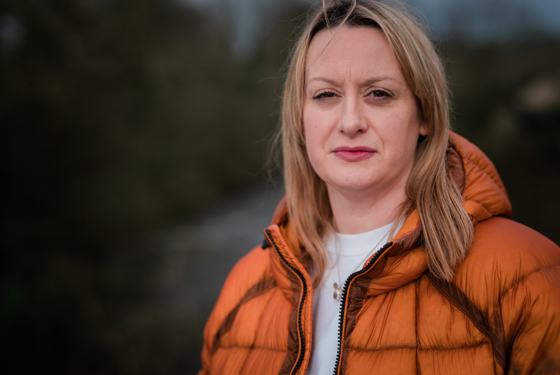Women face extreme pain, heavy bleeding, and poor mental health as waiting lists reach record numbers
- New data shows gynaecology waiting lists have faced the biggest increase of all medical specialities
- Women living with debilitating symptoms say they are suffering with poor mental health as more than 1 in 20 people in England face a year long wait for treatment
- The Royal College of Obstetricians and Gynaecologists (RCOG) is calling for an overhaul of the way the NHS prioritises treatment
The RCOG has today published a report revealing the devastating impact on the 570,000 women in the UK who are facing prolonged waits for gynaecology appointments, diagnoses and treatments.
Concerns around how these delays are affecting both women’s physical and mental health have led to the RCOG calling for an overhaul of how gynaecology care and treatments are prioritised by the NHS, looking beyond clinical need and recognising the severe impact on quality of life.
A survey conducted by the RCOG of 837* women who are waiting for gynaecology care revealed the impact these waits are having, with:
- Four fifths (80%) of women saying their mental health has worsened due to the wait
- 1 in 4 of those whose mental health had deteriorated, pain was given as a reason.
- More than three quarters (77%) of women saying that their ability to work or take part in social activities had been negatively impacted.
- 61% saying they felt despair at the long waits, and 63% feeling ignored.
Rachael is 44 and lives in the North West with her husband and two children. She is waiting for treatment for her prolapse following an initial appointment with a gynaecologist, and is also experiencing difficult symptoms from the perimenopause:
“It was in 2019 that I first saw a gynaecologist for prolapse and was referred both to a pessary clinic and to a women’s health physio. Since then, I have had multiple pessaries that haven’t managed to alleviate the symptoms from the prolapse, and I was put on the waiting list for surgery before the start of the COVID-19 pandemic. I have been waiting ever since. I have mixed messages each time I speak to a consultant or a member of staff at the hospital about when my surgery might be.
“I had to give up work last year because I just feel exhausted a lot of the time. I’m no longer interested in socialising unless I know I can sit down, or won’t be walking too far. I can’t even do gentle exercise without the pain that follows, it just aggravates it. I’m just trying to bring up two young kids, and keep physically well, and it makes everything so much harder. I feel like my whole life is on pause.”
The pandemic led to non-urgent elective treatments being paused, and throughout each wave has prevented the NHS from delivering much of the planned care it ordinarily would. This has created the biggest backlog in elective care the NHS has ever seen.
Even before the pandemic, gynaecology waiting lists were growing, with the growth of waiting lists outstripping other specialties since April 2018. Analysis provided by LCP Health Analytics has shown that since the start of the pandemic, gynaecology waiting lists have grown by 59% to over 570,000.
The worry of waiting for care, not knowing when they will be treated, the inability to plan ahead, and the prospect of continuing to manage symptoms whilst they wait, are the emerging themes that have caused many women’s mental health to suffer.
In England, the number of women waiting over a year for treatment has gone from less than one in one thousand women on the waiting list before the pandemic to more than one in 20.
There is also stark geographical variation in the length of gynaecology waiting lists across England, with the North West having 8 out of the 10 worst affected Clinical Commissioning Groups (CCGs). This is creating a post code lottery for gynaecological case. Comparing the worst affected CCG with the least affected CCG shows that the worst affected has a waiting list over five times larger than that of the CCG with the lowest waiting list.
Gynaecologists have raised concerns that the long-term management of pain and symptoms is becoming unsustainable for women and people with these conditions, and is having a negative impact on their quality of life. The consequences for many women has limited their ability to work, to socialise, impacted on their relationships and family life.
The RCOG’s report ‘Left for too long: understanding the scale and impact of gynaecology waiting lists’ makes a series of recommendations to improve the situation for women. These include changing the way care is prioritised by the NHS, focusing funding on areas where waiting lists are longest to end the postcode lottery, and ring-fencing funding for recovery and long-term sustainability of elective gynaecology.
Rebecca Sloan, Women’s health lead at LCP, commented: “The pandemic has exacerbated already large waiting lists for women needing gynaecology treatment across the country, with gynaecology waiting lists increasing at one of the fastest rates of all specialities between April 2018 and February 2020 and since the pandemic the waiting list has continued to increase at the highest rate of all other specialities. While waiting lists show the amount of people currently waiting, they don’t show the true scale because there are many people who have health issues but have not yet come forward for treatment due to the pandemic.
“This hidden health need is likely to overstretch an already pressured NHS if resources aren’t urgently diverted to the parts of the country where waiting times are at crisis point. There is the risk that thousands more women could be living with discomfort, pain and a real impact on their lives if action isn’t taken.”
Dr Edward Morris, President of the Royal College of Obstetricians and Gynaecologists, said:
“Hundreds of thousands of women with gynaecological conditions across the UK are being forced to tolerate extreme pain and debilitating symptoms because of unacceptable waiting lists for diagnosis and treatment.
“As a consultant gynaecologist, I personally feel helpless speaking to women about the impact these waits are having on both their physical and mental health, and not being able to do anything to speed up their access to care.
“We believe the reason gynaecology waiting lists have seen the biggest growth is because time and again we see women’s health consistently deprioritised and overlooked. At its core it is gender bias and it’s reflective of society as a whole. Women are being let down and change is urgently needed.
“The RCOG is calling for an overhaul of the way the NHS prioritises treatment, looking beyond clinical need recognising the suffering of these women. The NHS must take meaningful action to ensure that those on waiting lists are given priority based on the impact that their conditions are having on their quality of life as a whole – especially as we emerge from the pandemic.”
ENDS
For media enquiries please contact the RCOG press office on +44 (0)7740 175342 or email pressoffice@rcog.org.uk.
Notes to Editor
- Read the full RCOG policy report: Left for too long: Understanding the scale and impact of gynaecology waiting lists
- Link to LCP Health Analytics Waiting List Tracker
- *The survey of 837 women was conducted between 16 November and 31 December 2021. It was shared with patient information groups, across RCOG’s social media channels and through other women’s health networks. The survey asked women to share their experiences of accessing gynaecology care during the pandemic. Full results are available from the press office.
Anyone struggling with their mental health is encouraged to access support from Samaritans or Mind, and speak to their GP.
About LCP
At LCP, our experts provide clear, concise advice focused on your needs. We use innovative technology to give you real time insight & control. Our experts work in pensions, investment, insurance, energy and technology and analytics.
Our health analytics team leverages the increasing availability of data and our cutting-edge modelling approaches to put timely actionable data in the hands of key stakeholders. We provide bespoke analysis to shift populations from illness to health. The firm has more than 700 staff based at locations in London, Winchester, Ireland, and - operating under licence - the Netherlands.
About the RCOG
The Royal College of Obstetricians and Gynaecologists is a medical charity that champions the provision of women’s healthcare in the UK and beyond. It is dedicated to encouraging the study and advancing the science and practice of obstetrics and gynaecology. It does this through postgraduate medical education and training and the publication of clinical guidelines and reports on aspects of the specialty and service provision.


